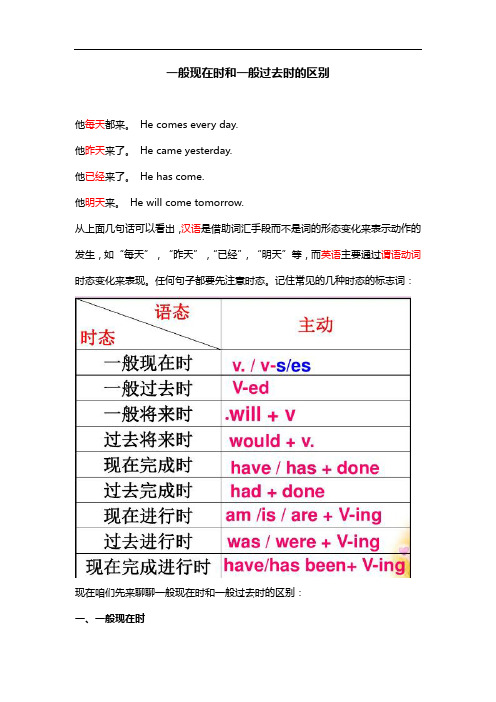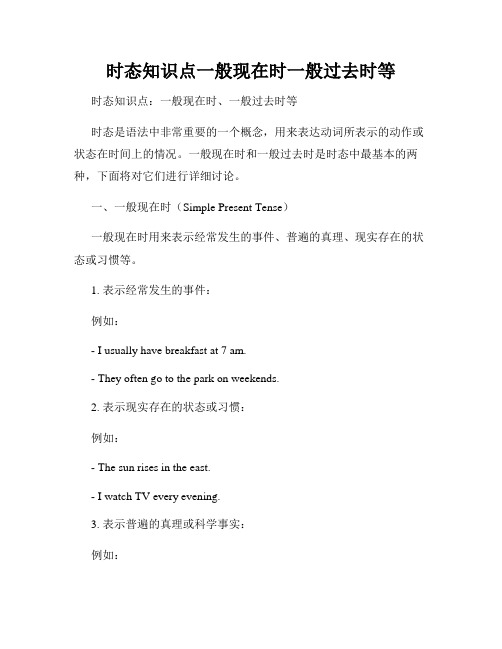一般现在时和一般过去时
一般现在时和一般过去时

一般现在时讲解及练习1、定义与讲解一般现在时:表示经常性的事情,经常性的动作或一般性事实。
时间状语:often 经常,usually通常,always 总是,every+名词每个,sometime s 有时,once a week ,on Sundays ,if 的从句at …在几点钟2. 表示客观真理,科学原理,自然现象,等客观事实或格言,谚语等。
The sun rises in the east and sets in the west every day.The man who has never been to the Great Wall is not a real man.Tomorrow is Tuesday.只有在第三人称单数用动词的“三单变化”,其他用动词的原形。
三单变化:(1)直接在动词词尾加-s.ask---asks work---works get---gets stay---stays(2)以字母s, x, ch, sh或o结尾的动词,在词尾直接加-es.watch---watches wish---wishes fix---fixes pass---passes(3)以“辅音字母加- y”结尾的动词,要先变y为i再加-es.try---tries study---studies cry---cries fly---flies play —plays2.不规则变化:be---- is are have----has do---does go---goes三、一般现在时的句子转换:(1)当句子中有be动词或情态动词时,则把be 动词或情态动词(can,could等等)提到主语的前面变成疑问句;在be动词或情态动词后面加not变成否定句陈述句She is a student.疑问句Is she a student? 否定句She is not a student.陈述句:I can swim.疑问句→ Can you swim否定句→ I can not swim.(2)当句子中即没有be动词,也没有情态动词时,则在主语前加助动词do (you,以及复数), does(单数she,he,it)变成问句;在主语后谓语动词前加助动词don’t(I, you,以及复数), doesn’t(单数she,he,it)变成否定句,助动词后的动词要变成动词原形。
如何区分一般现在时

如何区分一般现在时、现在进行时、一般过去时、一般将来时、一、一般现在时:概念:经常、反复发生的动作或行为及现在的某种状况。
例:He listens to the radio every evening.时间状语:always, usually, often, sometimes, every week (day, year, month…), once a week, on Sunday, etc.基本结构:①be动词;②行为动词否定形式:①am/is/are +not;②此时态的谓语动词若为行为动词,则在其前加don't,如主语为第三人称单数,则用doesn't,同时还原行为动词。
一般疑问句:①把be动词放于句首;②用助动词do提问,如主语为第三人称单数,则用does,同时,还原行为动词。
二、一般过去时:概念:过去某个时间里发生的动作或状态;过去习惯性、经常性的动作、行为。
例:I wasborn on April 2, 1986.时间状语:ago, yesterday, the day before yesterday, last week(year, night, month…), in 1989, just now, at the age of 5, one day, once upon a time, etc.基本结构:①be动词;②行为动词否定形式:①was/were +not;②在行为动词前加didn't,同时还原行为动词。
一般疑问句:①was或were放于句首;②用助动词do的过去式did 提问,同时还原行为动词。
三、现在进行时:概念:表示现阶段或说话时正在进行的动作及行为。
时间状语:at the monment look listen\now例:The woman is talking to the doctor.时间状语:now, at this time, these days, etc.基本结构:am /is/are +doing否定形式:am /is/are +not +doing.一般疑问句:把be动词放于句首。
一般过去时和一般现在时的知识梳理

一般过去时和一般现在时的知识梳理一般过去时和一般现在时是英语中最基本的两种时态,它们用来描述不同的时间状态。
下面将分别对这两种时态进行详细的梳理。
一、一般过去时1. 一般过去时的基本用法一般过去时用来描述过去某个时间发生的动作或存在的状态,通常和表示过去的时间状语连用,如yesterday(昨天)、last week (上周)、two years ago(两年前)等。
例如:- I went to the park yesterday.(我昨天去了公园。
)- They studied English last night.(他们昨晚学习了英语。
)2. 一般过去时的构成一般过去时的肯定句结构为“主语+ 动词过去式+ 其他”,否定句结构为“主语+ did not + 动词原形+ 其他”,疑问句结构为“Did + 主语 + 动词原形 + 其他”。
例如:- He played basketball with his friends.(他和朋友们打篮球。
)- They did not watch the movie.(他们没有看那部电影。
)- Did you visit your grandparents last weekend?(你上周末去看望你的祖父母了吗?)3. 一般过去时的时间状语一般过去时常常和表示过去的时间状语连用,如yesterday(昨天)、last month(上个月)、in 1999(在1999年)等。
时间状语可以出现在句首、句中或句末。
例如:- Last night, I watched a movie.(昨晚,我看了一部电影。
)- He lived in New York for five years.(他在纽约住了五年。
)二、一般现在时1. 一般现在时的基本用法一般现在时用来描述当前的状态、习惯或经常发生的动作。
它表示的是客观事实或普遍真理,与时间无关。
例如:- The sun rises in the east.(太阳从东方升起。
一般现在时和一般过去时区别

一般现在时和一般过去时的区别他每天都来。
He comes every day.他昨天来了。
He came yesterday.他已经来了。
He has come.他明天来。
He will come tomorrow.从上面几句话可以看出,汉语是借助词汇手段而不是词的形态变化来表示动作的发生,如“每天”,“昨天”,“已经”,“明天”等,而英语主要通过谓语动词时态变化来表现。
任何句子都要先注意时态。
记住常见的几种时态的标志词:现在咱们先来聊聊一般现在时和一般过去时的区别:一、一般现在时概念:经常、反复发生的动作或行为及现在的某种状况。
时间状语:always, usually, often, sometimes, every week (day, year, month...), once a week, on Sundays, etc.基本结构:一般现在时通常是以动词原形表示的,但在主语为第三人称单数时,动词词尾要加-s或-es,规则如下:(1)当动词以-s, -ss, -sh, -ch, -x, -o结尾时,加-es。
如:kiss—kisses wash—washes teach—teaches box—boxes go—goes (2)当动词以“辅音字母+y" 结尾时,改y为i再加-es,如:carry—carries fly—flies try—tries study—studies(3)动词be的一般现在时表现形式是:am, is, are, 根据人称和数的不同而分别采用。
(4)have的第三人称单数形式是has。
(5)除上述情况外,其余动词在词尾加-s。
一般现在时的用法:1、表示客观真理和科学事实、格言以及其他没有时间限制的客观存在。
如:Twice two is four. 2的两倍是4。
The Great Wall is the longest wall in the world. 长城是世界上最长的城墙。
一般现在时与一般过去时用法比较

yesterday , yesterday morning , last week , two days ago , after , the day before yesterday
2. do,does, did 后所跟动词用原形,且只出现在否定句 和疑问句中。
3. 动词第三人称单数形式的构成。 4. 动词过去式的构成,且要注意规则动词与不规则动
earth __m__o_v_es__(转) around the sun . 11.Light __tr_a_v_e_l_s___(传播) faster than sound . 12.The sun __r_is_e_s______(升起) in the east . 13.If it __d_o_e_sn_’_t_r_a_i_n__(不下雨) tomorrow , we will go to
26. Jim __h_a_d___(吃) some bread for breakfast yesterday .
27. I __w__e_n_t_h_o_m__e__ (回家) at half past five the day
before yesterday .
28. Last year we __h_e_lp_e_d___ (帮助)the farmers with the
taught (过去式构成)
don’t teach, doesn’t teach
didn’t teach
Do/Does + …+teach Did +…+teach 动词用原形(同否定) 动词用原形(同否定)
常识
1. 常用的时间状语: 一般现在时:
often , always, sometimes , every day , on Sunday
时态知识点一般现在时一般过去时等

时态知识点一般现在时一般过去时等时态知识点:一般现在时、一般过去时等时态是语法中非常重要的一个概念,用来表达动词所表示的动作或状态在时间上的情况。
一般现在时和一般过去时是时态中最基本的两种,下面将对它们进行详细讨论。
一、一般现在时(Simple Present Tense)一般现在时用来表示经常发生的事件、普遍的真理、现实存在的状态或习惯等。
1. 表示经常发生的事件:例如:- I usually have breakfast at 7 am.- They often go to the park on weekends.2. 表示现实存在的状态或习惯:例如:- The sun rises in the east.- I watch TV every evening.3. 表示普遍的真理或科学事实:例如:- Water boils at 100 degrees Celsius.- The earth revolves around the sun.4. 表示感觉、看法、经验等个人态度:例如:- I love chocolate.- She hates spiders.注意事项:- 在第三人称单数形式中,动词要加上"-s"或"-es"。
- 对于一些规则动词,如work、study等,第三人称单数形式只需要加上"-s"。
- 对于以辅音字母加"y"结尾的动词,要将"y"改为"i"并加上"-es";对于以元音字母加"y"结尾的动词,直接加上"-s"。
二、一般过去时(Simple Past Tense)一般过去时用来表示过去发生的动作或状态,常常与具体的时间状语连用,如yesterday、last week等。
1. 表示过去发生的事件:例如:- I visited my grandparents last weekend.- They watched a movie together yesterday.2. 表示过去的习惯或状态:例如:- He used to live in New York.- She had a pet dog when she was a child.3. 表示过去的真理、科学事实或历史事件:例如:- The dinosaurs became extinct millions of years ago.- Columbus discovered America in 1492.4. 表示间接引语中的陈述句:例如:- He said he loved her.注意事项:- 对于大多数动词,我们只需要在动词原形的基础上加上"-ed"。
一般现在时,与一般过去时
借 对了!我可以 一个助动词do
DDido they buy any milk?
过去式转移到第一个动词
否定句
He wwoorkrekds in the city.
He dodiedns’tn’t work in the city.
在过去时态里,动词只有一种 过去式 形式。
特殊疑问句
does
原形 过去式
一般现在时:事实,实际 情况(大实话,大白话); 习惯,经常
This is a tree.
We have some classes every day.
特殊疑问词+did+主语+动原+ 其它?
Why did he go home?
时 态
一 般 现 在 时 一般过去时
第三人 不是第三 无论主语是第
主 语
称单数 人称单数
he ,she 形式
,it ,
we,you,
几人称,也不 管数量是多少
Kate they
(1个,1万个)
动
第三人 称单数
词 形式
is has
一般现在时
与
一般过去时
在同一种句子中,二者 在句子成分的顺序, 语序上没有区别。所 不同的是一般现在时 变为一般过去时,只 要把动词由原形或第 三人称单数形式变为 过去式
I wamasat home .
一般现过去在时
规律:一般现在时变为一 般过去时,变化的是:am was 其余的 不变
sHhe wisaslate.
一般现过去在 时
一般现在时变为一般过去时
,只要把 is wa,s 其余的
不变
TYWhoeeuy awreere from Shandong.
一般现在时与一般过去时
大家来找茬
I goes to school everyday. Miss Smith teach English. My watch sayes ten to five. He arrives in hangzhou an hour ago. She were an orphan and gave piano lessons to
注:表示过去反复的动 作或习惯的动作时也 得用would或used to 加动词原形。
3.At that time she spoke english very well.
表示主语过去的特征 或状态、行为等。
4.I wrote a letter yesterday. 表示在过去某段时间 内完成的动作。
2.He never wears a hat in 表示习惯、能力、特征、
winter.
性格或说话时的感觉、状
态等。
3.The earth moves around 表示客观事实或普遍真理。 the sun.
Knowledge is power.
4.The meeting is at nine 表示按规定要发生的未来的动作或
tomorrow morne leave start stay return begin 等
Train leaves at eight pm. 动词,后面常接时间状语。)
5.What time is it now? 表示说话时刻的状态或情况。
主语为第三人称时:
简单的时态一般现在时和一般过去时
简单的时态一般现在时和一般过去时时态是语言中的一个重要方面,它用来描述动作、状态或事实发生的时间。
在英语中,时态分为一般现在时和一般过去时两种。
本文将分别介绍这两种时态的用法和形式。
一、一般现在时一般现在时表示经常性、习惯性或普遍真理,以及当前存在的状态或行为。
以下是一般现在时的几种常见用法:1. 描述客观事实或普遍真理例如:- The sun rises in the east.(太阳从东方升起。
)- Water boils at 100 degrees Celsius.(水在摄氏100度沸腾。
)2. 表示习惯性的动作或状态例如:- I usually go for a walk in the evening.(我通常晚上散步。
)- They always eat lunch at noon.(他们每天中午都吃午饭。
)3. 表示现阶段的状态或常态例如:- I live in Shanghai.(我住在上海。
)- He works as a teacher.(他是一名教师。
)一般现在时的形式为主语加动词的原形,不论主语是第一、第二还是第三人称单数或复数,动词保持不变。
例如:- I study English every day.(我每天学英语。
)- You work hard.(你努力工作。
)- He, she, it reads books.(他,她,它读书。
)- We, you, they play soccer.(我们,你们,他们踢足球。
)二、一般过去时一般过去时表示过去某个时间发生的动作或状态。
以下是一般过去时的几种常见用法:1. 描述过去发生的具体事件或动作例如:- I visited my grandparents last week.(上周我拜访了我的祖父母。
)- She cooked a delicious meal for us yesterday.(昨天她为我们做了一顿美味的饭菜。
一般现在时与一般过去时的区别
一般现在时与一般过去时的区别一般现在时和一般过去时是英语语态中比较常见的两种时态形式。
它们分别用于表达现在和过去的动作或状态,并在使用上存在着一些明显的区别。
1. 时间范围:一般现在时用于描述经常发生的动作、状态或普遍真理。
它强调的是客观性和普遍性,不具备时间上的限定。
例如:- She walks to school every day.(她每天走路去学校。
)- Cats like to play with yarn.(猫喜欢玩毛线。
)- The sun rises in the east.(太阳从东方升起。
)一般过去时用于过去发生的动作、状态或经验。
它表达的是在过去某个具体时间内发生的事情,与现在无关。
例如:- He lived in Paris for five years.(他在巴黎住了五年。
)- I played football with my friends yesterday.(昨天我和朋友们踢足球。
)- They visited their grandparents last summer.(他们去年夏天拜访了他们的祖父母。
)2. 动词形式:在一般现在时中,大多数动词使用原形;第三人称单数使用动词的第三人称单数形式(在动词后加-s/-es)。
例如:- I watch TV every evening.(我每天晚上看电视。
)- She often reads books in her free time.(她经常在空闲时间看书。
)在一般过去时中,大多数动词使用过去式形式来表示过去发生的动作或状态。
例如:- I watched a movie last night.(昨晚我看了一部电影。
)- He cooked dinner for his family yesterday.(昨天他给家人做了晚餐。
)3. 表示方式:一般现在时用于陈述客观事实或经常性动作,表达一种普遍真理。
例如:- Water boils at 100 degrees Celsius.(水在100摄氏度时沸腾。
- 1、下载文档前请自行甄别文档内容的完整性,平台不提供额外的编辑、内容补充、找答案等附加服务。
- 2、"仅部分预览"的文档,不可在线预览部分如存在完整性等问题,可反馈申请退款(可完整预览的文档不适用该条件!)。
- 3、如文档侵犯您的权益,请联系客服反馈,我们会尽快为您处理(人工客服工作时间:9:00-18:30)。
一般现在时讲解及练习1、定义与讲解一般现在时:表示经常性的事情,经常性的动作或一般性事实。
时间状语:often 经常,usually通常,always 总是,every+名词每个,sometime s 有时,once a week ,on Sundays ,if 的从句at …在几点钟2. 表示客观真理,科学原理,自然现象,等客观事实或格言,谚语等。
The sun rises in the east and sets in the west every day.The man who has never been to the Great Wall is not a real man.Tomorrow is Tuesday.只有在第三人称单数用动词的“三单变化”,其他用动词的原形。
三单变化:(1)直接在动词词尾加-s.ask---asks work---works get---gets stay---stays(2)以字母s, x, ch, sh或o结尾的动词,在词尾直接加-es.watch---watches wish---wishes fix---fixes pass---passes(3)以“辅音字母加- y”结尾的动词,要先变y为i再加-es.try---tries study---studies cry---cries fly---flies play —plays2.不规则变化:be---- is are have----has do---does go---goes三、一般现在时的句子转换:(1)当句子中有be动词或情态动词时,则把be 动词或情态动词(can,could等等)提到主语的前面变成疑问句;在be动词或情态动词后面加not变成否定句陈述句She is a student.疑问句Is she a student? 否定句She is not a student.陈述句:I can swim.疑问句→ Can you swim否定句→ I can not swim.(2)当句子中即没有be动词,也没有情态动词时,则在主语前加助动词do (you,以及复数), does(单数she,he,it)变成问句;在主语后谓语动词前加助动词don’t(I, you,以及复数), doesn’t(单数she,he,it)变成否定句,助动词后的动词要变成动词原形。
陈述句:We get up at 7:00 every morning.疑问句Do you get up at 7:00 every morning?否定句→We don’t get up at 7:00 every morning.陈述句:She has a little brother.疑问句→ Does she have a little brother?否定句She doesn’t have a little brother.(一).用动词的适当形式填空1. She _________(go) to school at seven o’clock.3. He usually ___________ up at 17:00.(get )4. She ___________ (live) in Beijing.5. Amy _________ (be) here just now.6. _______ (be)there a fly on the table just now?7. My father __________ (watch) TV every evening .8. My father _______________ (make) toys these days.9.?________ Amy _________ (read) English every day10. Chen Jie sometimes _________(go)to the park with her sister.(二).选择填空1.I want____homework now. A. doing B. to do C. to do my D. do my 2.It's time______.A. go to schoolB. play gamesC. to go homeD. to do my homeworks 3.______go and help her. A. Let's me B. Let's us C. Let's D. Let's to4.Do they have a new car? Yes,_____.A .they are B.they have C. they don't D. they do5.He often _________ supper at 6:00 in the evening.A. haveB. has c. is having D. is eating6. We _____________ any Chinese classes on Friday.A. are havingB. aren’t havingC. don’t haveD. are have (三)、用括号内动词的适当形式填空。
1. He often _________ (have) dinner at home.2. Daniel and Tommy _________ (be) in Class One.3. We _________ (not watch) TV on Monday.4. Nick_________ (not go) to the zoo on Sunday.5._______ they _________ (like) the World Cup?6. What ____they often_________ (do) on Saturdays?7. your parents _________ (read) newspapers every day.8. The girl _________ (teach) us English on Sundays.9. She and I _________ (take) a walk together every evening.10. There _________ (be) some water in the bottle.11. Mike_________ (like) cooking.12. They _________ (have) the same hobby.13. My aunt _________ (look) after her baby carefully.14. You always _________ (do) your homework well.15. I _________ (listen) to the English songs twice a day ,16 Tom ____ (go) to school from Monday to Friday.17. Liu Tao _________ (do not ) like PE.18. The child often _________ (watch) TV in the evening. 21. We often___________(play) in the playgound.22. He _________(get) up at six o’cl ock.23. __________you _________(brush) your teeth every morning.24. What ________he usually__________ (do) after school?25. Danny usuallly ______(study) English,Chinese ,Science and Art at school.26. Mike sometimes __________(go) to the park with his sister.27. she always __________(watch) TV with his parents.28. ________ Mike________(read) English every day?29. We will go shopping if it____ tomorrow.A don't rain B. didn't rain C.doesn't rain D. isn't rain9. How many lessons_________your classmate________(have) on Monday?10.What time_________his mother_________(do) the housework?1. Do you often play football after school? (肯定回答)2. I have many books. (改为否定句)3. Gao Shan’s sister likes playing table tennis (改为否定句)4. She lives in a small town near New York. (改为一般疑问句)5. I watch TV every day. (改为一般疑问句)6. David has got a goal. (改为一般疑问句)7. We have four lessons.(否定句)8. Nancy doesn’t run fast (肯定句)9. My dog runs fast. 否定句:一般疑问句:10. Mike has two letters for him.一般疑问句:否定句:11. I usually play football on Friday afternoon.否定句:一般疑问13. Mingming usually waters the flowers every day否定一般疑问句:划线提问14. Tom does his homework at home.否定句:一般疑问句:划线提问1.写出下列动词的三单形式go__________ catch_________ brush(刷)_____ wash___________do________ like________ have___________ watch________drink ___________ fly___________ say_______ learn ___________eat___________ read___________ sing___________ buy__________study_______ stay __________ make __________ look ____pass__________ carry ____ come_________ teach_______ buy_________ 3.选择题1. I ________to school at 7:00 in the morning.A. go B. going C. goes2. They ____books every day in the library. A.reads B. read C. reading3. The monkey_____eating bananas very B. likes C. liking4. My father ________to read newspaper after supper every day.A.likeB. likesC. liking5. I like watching TV, but my mother __like it.A. don’t B. doesn’t C. does6. ____your father drink milk every day? A.do B. are C. does8. He said the sun ____in the east and ____in the west.A rose; setB rises; setsC rises, setD rise; sets9.Wang Mei ____ music and often ____ to music.A like; listenB likes; listensC like; are listeningD liking ; listen10. Jenny____ English every evening.A has studyB studiesC studyD studied4.改错(划出错误的地方,将正确的写在横线上)1. Is your brother speak English? __________________2. Does he likes going fishing? __________________3. He likes play games after class. __________________4. Mr. Wu teachs us English. __________________5. She don't do her homework on Sundays. _________________5.把下列句子变成一般疑问句(并作肯定和否定回答)、否定句I don't like cooking.1.My friends like playing soccer.2.They speak English every day.3.Daniel watches TV every evening4.John is from Canada.5.Tom does his homework at home.6.My dog runs fast.7Amy likes playing computer games.8She can play the piano well.一、一般过去时的定义一般过去时表示过去某一时候或某一段时间所发生了的事情或存在的状态。
